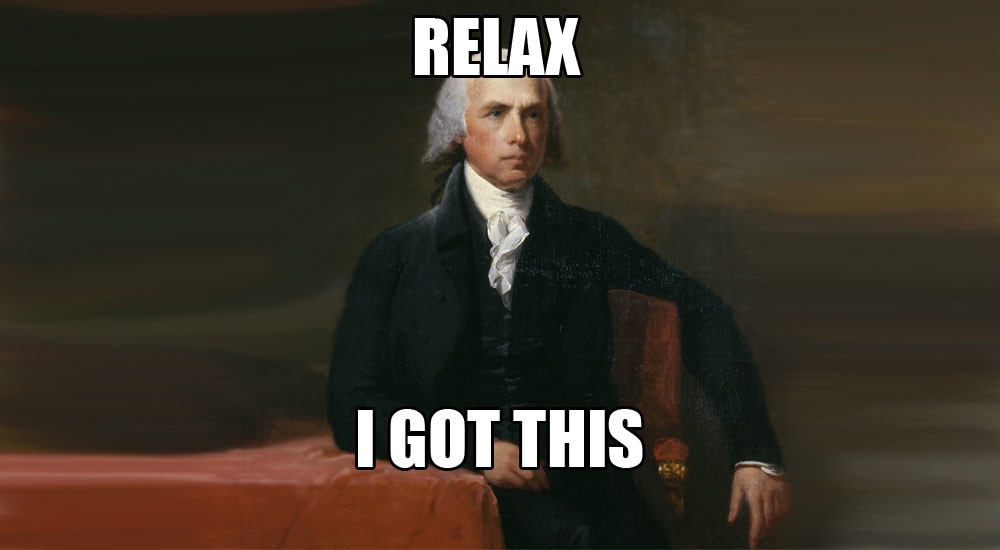Virginian James Madison, and Separation of Church and State
Dr. Heather Cox Richardson is an American historian and professor of history at Boston College. Her Letters From An American, nightly narratives sharing updates of the day’s news, began in September 2019 and became incredibly popular because of her low-key, rational approach to current political events, often drawing parallels to America’s past. Her Substack is free and she also shares Letters through Facebook.
Earlier this week, while reading Dr. Richardson’s Letter from November 1, she offered a reminder of the origin of separation of church and state in America, and how the lines have become more blurred. Virginians James Madison and Thomas Jefferson were very specific about the issue. Sometimes it helps to look back at what the Founders said about various issues facing what, to them, was a newly-born country.
It also gives pause wondering what they would say in 2023 America, and what advice they may have. That could be a very intriguing conversation, sort of like the time-hop movies when someone from the past pops into current times. I often think about Thomas Jefferson, being the inventor and inquisitive researcher that he was, and what his thoughts would be on any number of current issues and the wonder of modern science.
This entire Letter is a good educational read but I was particularly interested in the paragraphs shared below. Separation of church and state … some have perhaps forgotten what that was all about.
“[U.S. House Speaker Mike] Johnson rejects the separation of church and state in our government, saying that the framers’ idea ‘clearly did not mean … to keep religion from influencing issues of civil government. To the contrary, it was meant to keep the federal government from impeding the religious practice of citizens. The Founders wanted to protect the church from an encroaching state, not the other way around.’
“Actually, James Madison of Virginia, the key thinker behind the Constitution, had quite a lot to say about why the government and religion must be kept apart.
“In 1772, when he was 21, Madison watched as Virginia arrested itinerant preachers for attacking the established church in the state. He was no foe of religion, but by the next year, he had begun to question whether established religion, which was common in the colonies, was good for society. By 1776, many of his broad-thinking neighbors had come to believe that society should ‘tolerate’ different religious practices; he had moved past tolerance to the belief that men had a right of conscience.
“In that year, he was instrumental in putting Section 16 into the Virginia Declaration of Rights, on which our own Bill of Rights—the first ten amendments to the Constitution—would be based. It reads: ‘That religion, or the duty which we owe to our Creator, and the manner of discharging it, can be directed only by reason and conviction, not by force or violence; and therefore all men are equally entitled to the free exercise of religion, according to the dictates of conscience; and that it is the mutual duty of all to practice Christian forbearance, love, and charity toward each other.’
“In 1785, in a ‘Memorial and Remonstrance against Religious Assessments,’ Madison explained that what was at stake was not just religion, but also representative government itself. The establishment of one religion over others attacked a fundamental human right—an unalienable right—of conscience. If lawmakers could destroy the right of freedom of conscience, they could destroy all other unalienable rights. Those in charge of government could throw representative government out the window and make themselves tyrants.
“Madison believed that a variety of religious sects would balance each other out, keeping the new nation free of the religious violence of Europe. He drew on that vision explicitly when he envisioned a new political system, expecting that a variety of political expressions would protect the new government. In Federalist #51, he said: ‘In a free government the security for civil rights must be the same as that for religious rights. It consists in the one case in the multiplicity of interests, and in the other in the multiplicity of sects.’
“In order to make sure men had the right of conscience, the First Amendment to the Constitution reads: ‘Congress shall make no law respecting an establishment of religion, or prohibiting the free exercise thereof….’
“In 1802, President Thomas Jefferson called this amendment ‘a wall of separation between Church & State.’ In a letter of January 1, 1802, he explained to a group of Baptists from Danbury, Connecticut, how that principle made him refuse to call for national religious days of fasting and thanksgiving in his role as head of the government.
“Like Madison, he maintained that ‘religion is a matter which lies solely between Man & his God, that he owes account to none other for his faith or his worship.’ ‘[T]he legitimate powers of government reach actions only,’ he wrote, ‘[and] not [religious] opinions.’
“ ‘[T]hat act of the whole American people which declared that their legislature should ‘make no law respecting an establishment of religion, or prohibiting the free exercise thereof,’ he wrote, built ‘a wall of separation between Church & State.’ It prevented him even from such religious practices as declaring a day of fasting in times of trouble, or thanksgiving in times of triumph.”
History is watching America.


